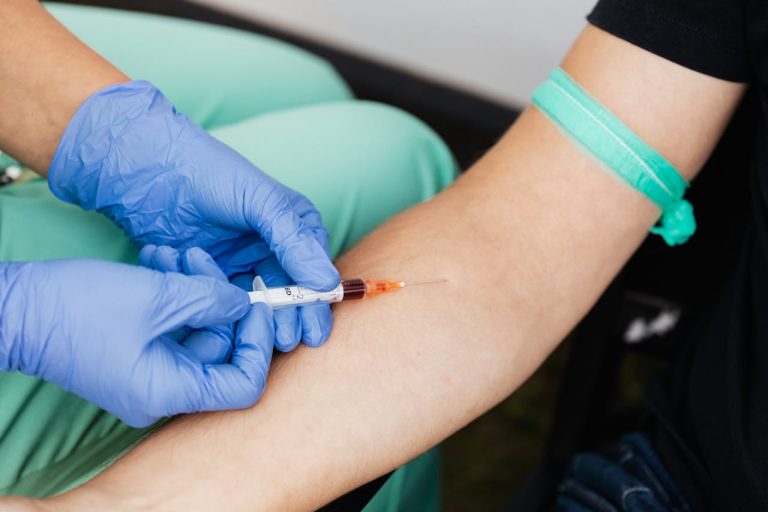
Phlebotomy Training
Welcome to our Phlebotomy Training Course, designed to immerse you in the essential skills and knowledge required for a successful career as a phlebotomist. In this course, you will learn how vital blood tests are in diagnosing illnesses and how you can be a crucial partner in the healthcare team.
What will be covered:
Anatomy of Blood and the Circulatory System
Gain a deeper understanding of the fundamental components of the circulatory system, including:
- Blood Composition: Explore the different elements that make up blood and their functions.
- Types of Blood Vessels: Understand the main types of blood vessels and the specific veins commonly used for venipuncture.
- Blood Types: Familiarize yourself with the various blood types and their significance in transfusion and medical procedures.
Phlebotomy Equipment and Techniques
Learn about the array of tools used in phlebotomy, including:
- Types of Equipment: Learn about the different types of phlebotomy equipment and their specific applications.
- Needle Selection: Discover how to choose the appropriate needle for each patient and situation, ensuring comfort and safety.
Mastering Venipuncture
Develop proficiency in routine venipuncture with comprehensive training on:
- Step-by-Step Procedure: Understand the entire process, from applying a tourniquet to safely bandaging a patient’s arm post-collection.
- Identifying Complications: Study potential complications during venipuncture and how to mitigate them effectively.
- Equipment Familiarization: Learn how to assemble and examine venipuncture equipment to ensure optimal performance.
Advanced Blood Collection Techniques
You’re also expected to learn:
- Dermal Punctures: Gain insight into the procedure and devices used for dermal punctures, including when and how to apply them.
- Contamination Prevention: Learn about common causes of contamination during blood collection and strategies to avoid them.
Quality Assessment and Documentation
Master the fundamentals of blood assessment, including:
- Quality Blood Assessments: Understand what constitutes a quality blood assessment and the importance of proper documentation.
- Variables in Testing: Explore the variables that can affect test results before, during, and after blood collection.
Specialized Testing Procedures
Expand your knowledge of specialized tests, including:
- Newborn Screening: Learn about the importance and procedures involved in newborn screening.
- Blood Cultures and Other Tests: Understand the protocols for blood cultures, glucose tolerance testing, and bleeding time tests.
- Phenylketonuria Awareness: Discover the implications of untreated phenylketonuria and its significance in patient care.
Infection Control and Patient Preparation
Finally, this course emphasizes the importance of:
- Infection Control: Gain insights into infection control measures and risk management strategies to ensure patient safety.
- Patient Preparation: Learn effective techniques for preparing patients for phlebotomy procedures, fostering a positive experience and outcome.
By the end of this course, you will be equipped with the knowledge and skills necessary to excel in the field of phlebotomy, ensuring high-quality patient care and professional success.
Who this course is for:
Phlebotomy training is beneficial for anyone looking to advance their careers in healthcare, including:
1. Aspiring Healthcare Professionals
- Individuals Starting Their Healthcare Careers: Those looking to enter the medical field can gain foundational skills that are highly sought after by employers.
- Nursing Students: Future nurses can benefit from phlebotomy training to enhance their patient care skills.
2. Current Healthcare Workers
- Medical Assistants: Those already working in medical assisting roles can expand their skill set and increase their job responsibilities.
- Laboratory Technicians: Technicians looking to specialize in blood collection can enhance their expertise and career prospects.
3. Individuals Seeking Career Change
- Career Changers: Those looking to pivot into a healthcare-focused role can find phlebotomy training to be a quick and effective way to enter the industry.
- Recent Graduates: Graduates from non-healthcare fields seeking a rewarding career can gain essential skills through phlebotomy training.
4. Healthcare Volunteers and Interns
- Volunteers in Hospitals: Individuals volunteering in clinical settings can enhance their contributions and understanding of patient care.
- Interns: Those in internships within healthcare facilities can make themselves more valuable with phlebotomy skills.
5. Personal Care Providers
- Home Health Aides: Personal care providers working in patients’ homes can benefit from learning phlebotomy to assist with at-home health monitoring.
- Community Health Workers: These professionals can enhance their ability to provide services to underserved populations.
6. Anyone Interested in Blood Donation or Research
- Blood Donor Center Staff: Individuals working in blood donation facilities can improve their skills and efficiency in blood collection.
- Research Assistants: Those involved in medical research that requires blood sample collection can find this training particularly useful.
Training Details
- Blended Learning (online and physical classes)
- Basic IT skills are essential
- Have access to a computer, tablet, or smartphone with access to the internet
- Dedicate time for practicals
Course content requirement:
- 5 days
Assessments per module covered.
Final Assessment at completion of the program.
Practicals to evaluate your understanding.
If successfully completed, you will be awarded a certificate by Beta Care Training Institute.
Cost: 35k
The fees should be paid by Direct Deposit to:
- Bank: Co-operative Bank
- Branch: Githunguri
- Account name: Beta Care Training Institute
- Account no: 1192538722900
You can also pay via Lipa na M-Pesa; Paybill
- Business number: 400222
- Account number: 7229#ID No
Please call 0708177909 for more information.
